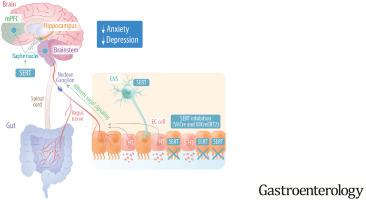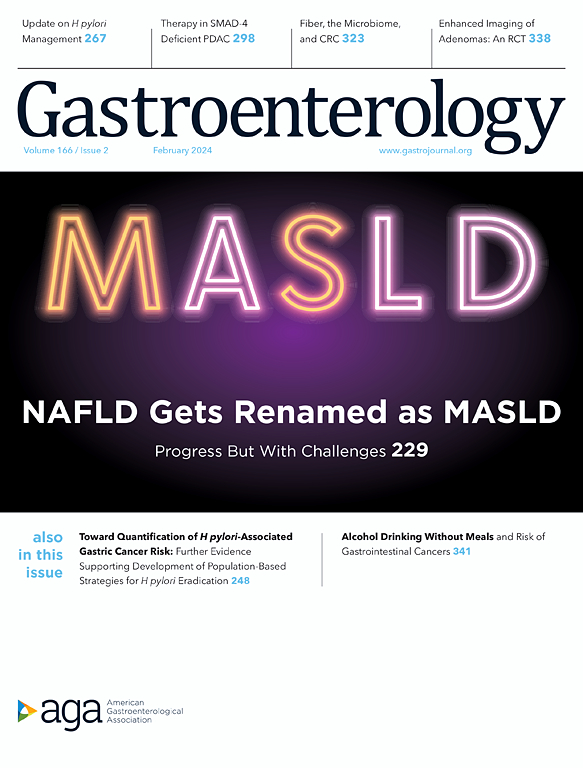Intestinal Epithelial Serotonin as a Novel Target for Treating Disorders of Gut-Brain Interaction and Mood
IF 25.7
1区 医学
Q1 GASTROENTEROLOGY & HEPATOLOGY
引用次数: 0
Abstract
Background & Aims
Mood disorders and disorders of gut-brain interaction (DGBI) are highly prevalent, commonly comorbid, and lack fully effective therapies. Although selective serotonin reuptake inhibitors (SSRIs) are first-line pharmacological treatments for these disorders, they may impart adverse effects, including anxiety, anhedonia, dysmotility, and, in children exposed in utero, an increased risk of cognitive, mood, and gastrointestinal disorders. SSRIs act systemically to block the serotonin reuptake transporter and enhance serotonergic signaling in the brain, intestinal epithelium, and enteric neurons. Yet, the compartments that mediate the therapeutic and adverse effects of SSRIs are unknown, as is whether gestational SSRI exposure directly contributes to human DGBI development.
Methods
We used transgenic, surgical, and pharmacological approaches to study the effects of intestinal epithelial serotonin reuptake transporter or serotonin on mood and gastrointestinal function, as well as relevant communication pathways. We also conducted a prospective birth cohort study to assess effects of gestational SSRI exposure on DGBI development.
Results
Serotonin reuptake transporter ablation targeted to the intestinal epithelium promoted anxiolytic and antidepressive-like effects without causing adverse effects on the gastrointestinal tract or brain; conversely, epithelial serotonin synthesis inhibition increased anxiety and depression-like behaviors. Afferent vagal pathways were found to be conduits by which intestinal epithelial serotonin affects behavior. In utero SSRI exposure is a significant and specific risk factor for development of the DGBI, functional constipation, in the first year of life, irrespective of maternal depressive symptoms.
Conclusion
These findings provide fundamental insights into how the gastrointestinal tract modulates emotional behaviors, reveal a novel gut-targeted therapeutic approach for mood modulation, and suggest a new link in humans between in utero SSRI exposure and DGBI development.

肠上皮5 -羟色胺作为治疗肠脑相互作用和情绪障碍的新靶点
背景,aimsmod障碍和DGBI非常普遍,通常合并症,缺乏完全有效的治疗方法。虽然ssri类药物是治疗这些疾病的一线药物治疗方法,但它们可能会带来包括焦虑、快感缺乏、运动障碍在内的不良影响,并且在子宫内暴露的儿童可能会增加认知、情绪和胃肠道疾病的风险。SSRIs系统阻断SERT,增强脑、肠上皮和肠神经元中的血清素能信号。然而,介导SSRI治疗和不良反应的室室尚不清楚,妊娠期SSRI暴露是否直接有助于人类DGBI的发展。方法采用转基因、外科和药理学方法研究肠上皮SERT或血清素对情绪和胃肠功能的影响,以及相关的通讯途径。我们还进行了一项前瞻性出生队列研究,以评估妊娠期SSRI暴露对DGBI发展的影响。结果靶向肠上皮的sert消融可促进抗焦虑和抗抑郁样作用,对胃肠道和大脑无不良影响;相反,上皮5 -羟色胺合成抑制会增加焦虑和抑郁样行为。传入迷走神经通路被发现是肠上皮血清素影响行为的通道。无论母亲是否出现抑郁症状,子宫内SSRI暴露是婴儿出生后第一年DGBI、功能性便秘发展的重要和特定风险因素。结论这些发现为胃肠道如何调节情绪行为提供了基本的见解,揭示了一种新的肠道靶向治疗方法来调节情绪,并提示了人类子宫内SSRI暴露与DGBI发展之间的新联系。
本文章由计算机程序翻译,如有差异,请以英文原文为准。
求助全文
约1分钟内获得全文
求助全文
来源期刊

Gastroenterology
医学-胃肠肝病学
CiteScore
45.60
自引率
2.40%
发文量
4366
审稿时长
26 days
期刊介绍:
Gastroenterology is the most prominent journal in the field of gastrointestinal disease. It is the flagship journal of the American Gastroenterological Association and delivers authoritative coverage of clinical, translational, and basic studies of all aspects of the digestive system, including the liver and pancreas, as well as nutrition.
Some regular features of Gastroenterology include original research studies by leading authorities, comprehensive reviews and perspectives on important topics in adult and pediatric gastroenterology and hepatology. The journal also includes features such as editorials, correspondence, and commentaries, as well as special sections like "Mentoring, Education and Training Corner," "Diversity, Equity and Inclusion in GI," "Gastro Digest," "Gastro Curbside Consult," and "Gastro Grand Rounds."
Gastroenterology also provides digital media materials such as videos and "GI Rapid Reel" animations. It is abstracted and indexed in various databases including Scopus, Biological Abstracts, Current Contents, Embase, Nutrition Abstracts, Chemical Abstracts, Current Awareness in Biological Sciences, PubMed/Medline, and the Science Citation Index.
 求助内容:
求助内容: 应助结果提醒方式:
应助结果提醒方式:


